While he cannot perform manual labour, Singh takes care of pretty much everything else—from deciding cropping patterns, monitoring the sowing, maintenance and harvest activities, overlooking the preparation of Jeevamrut and other biopesticides, and travelling to market his produce and training other farmers!
It was a hot summer day in May 2018. Karnail Singh, a farmer from the Bassi Ghulam Hussain village, was returning home after delivering fresh and organically grown seasonal veggies from his farm to his customers in Hoshiarpur.
When his scooter broke down, Singh was unperturbed. He had driven the vehicle for a better part of life and was able to fix it quickly, and move forward.
Out of nowhere, the heavy bough of a tree fell on him and the next thing he knew, he was on the ground. When he returned from a state of sudden disorientation, it appeared like the weight of the vehicle had trapped his lower body.
“I tried to move the vehicle using my hands. But I felt no sensation or pain, chest down. It felt dead. And so I did the only thing I could—I screamed.”
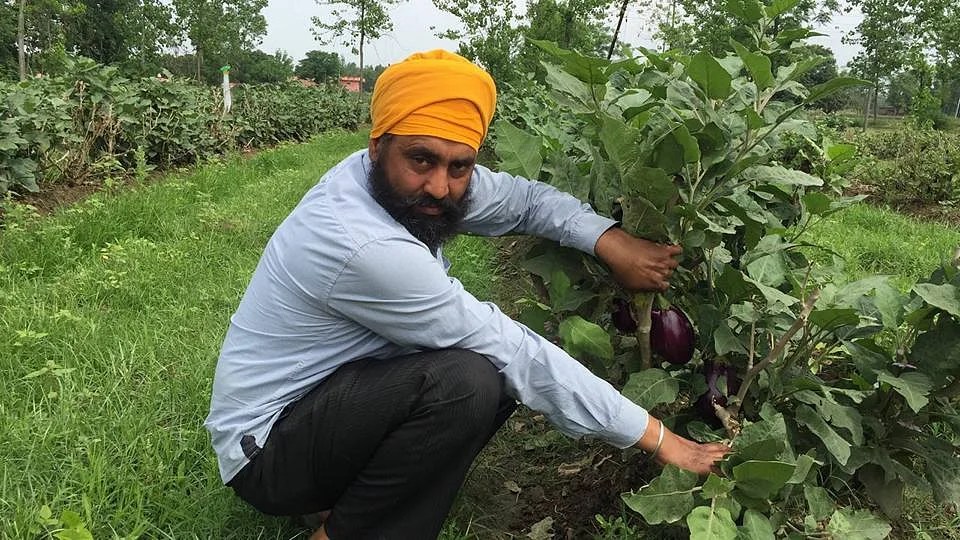
People rushed to his aid and soon, he was taken to a hospital in Hoshiarpur.
There, doctors informed his family that his spinal cord was severely damaged, and he was 70 per cent paralysed from the waist down. They suggested surgery, but there was little hope that it would work, so Singh decided to opt for intense physio, even though he knew that it would take years for him to gain control over his limbs.
Today, sitting atop a battery-powered tricycle, Karnail Singh spends six to seven hours in his field every day.
And while he cannot perform manual labour, he takes care of pretty much everything else—from deciding cropping patterns, monitoring the sowing, maintenance and harvest activities, overlooking the preparation of Jeevamrut and other biopesticides, and travelling to market his produce and training other farmers!
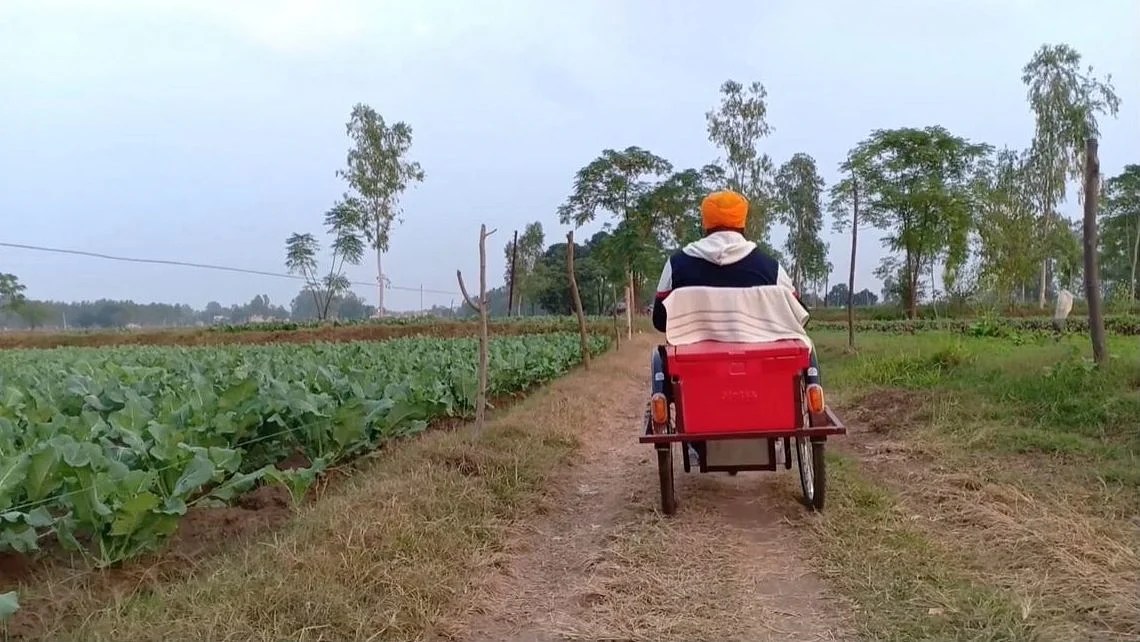
Speaking to The Better India, the farmer speaks about the aftermath of the accident and his return to farming; his first love.
“Following the accident, I spent about eight months confined to my room and faced another close shave with death due to breathing issues. That was when I decided to reclaim my life and return to farming. There were other issues as well. The mounting medical bills had exhausted our savings, and we were soon dependent on our friends and relatives. I rented out the 3-acre farm, but that money too ran out. Following this, we opened a small cloth shop in the village to make ends meet, but it never gave me the satisfaction that the smell of the soil, the joy of watching the seeds you have sown sprout into crops did. And so, once it became easy for me to move around on my battery-powered tricycle, I decided to return to farming,” says Singh.
Today in his organically certified farm, the man grows feed for his cattle in one acre and cultivates 15-18 types of seasonal vegetables and leafy greens in another one and a half-acre. In the remaining half-acre, he grows wheat which is the staple diet of the family.
How his journey into farming commence?
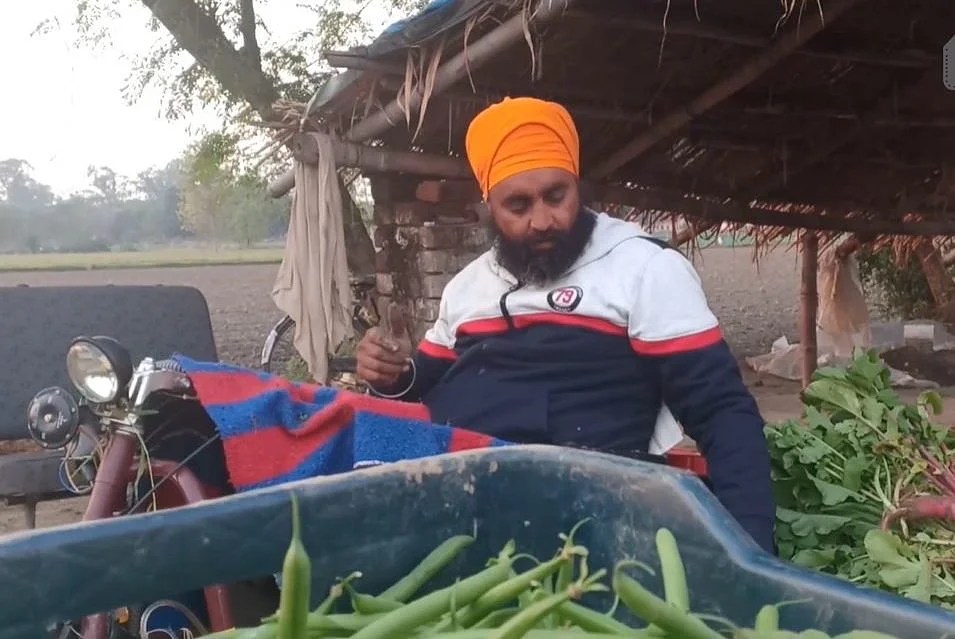
“I come from a farmer family, but the 1988 floods in River Sutlej washed and eroded our ancestral land. So, my father worked hard to purchase a 3-acre piece of land and breathe life into it. When I was in school, it was common for us to help our parents out on the farm. I used to be an artist. After completing my 10+2 in Fine Arts, I sold my fabric painting artwork. When the business took a hit, I moved on to become a full-time farmer”.
This was seven years ago. In the beginning, Singh, like most other farmers in the state, used chemicals. But it his sister-in-law’s death pushed him to give up the chemical ways and go back to the basics.
“She never smoked or drank, and when you live in a village, you are far away from pollution. So, what could possibly lead to cancer, other than the food that was ridden with poisonous chemicals? Her death was a big loss to our family, and made me decide to give up chemical farming completely and grow organic produce not just for my own family but everyone I sold it to.”
Singh joined the Innovative Farmers Association in Hoshiarpur, which propagates organic farming. When the group first started, it only had 10 farmers. Today this number has risen to 50. Apart from attending workshops on best practices in organic farming, it also imparts training and provides a market for organic produce.
“In my years of farming, I have realised that a farmer has to dive deep into the mind of the pest to successfully practice organic farming. That said, it is also important for the farmer to understand the difference between enemy pests and environment-friendly insects, bugs and microorganisms. Also, the benchmark of what can be considered a pest attack has to be set. Many times, in chemical farming, farmers, the minute they witness a bug/insect/pest on one plant will douse all their entire farm with chemical pesticides, not realising how poisonous and toxic, their an be.”
He highlights some of the practices of integrated pest management techniques:
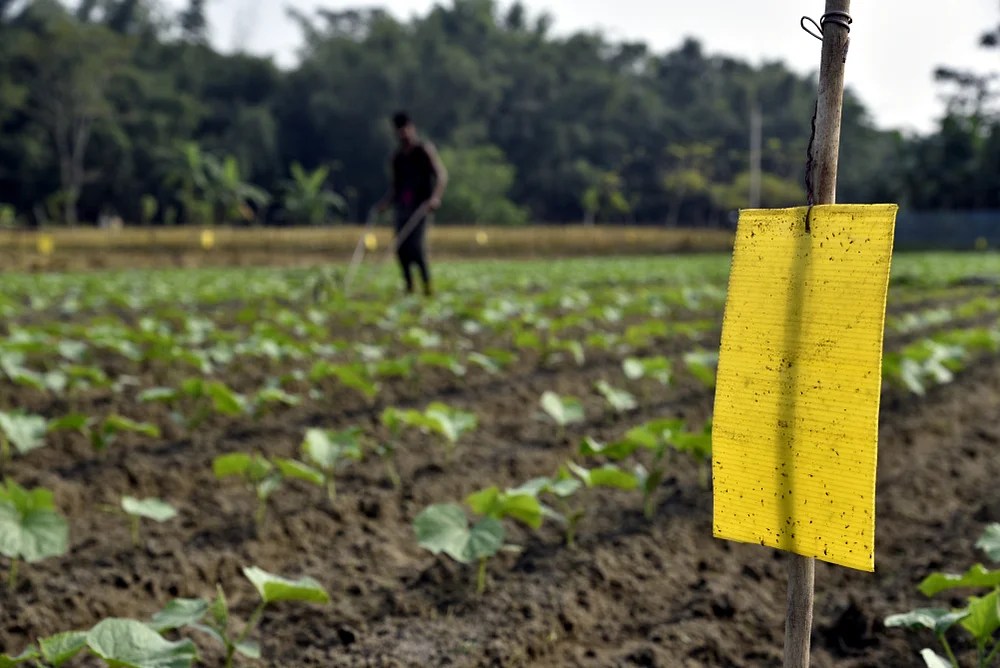
1. Controlling the pest at the larval stage
This ensures that once the chances of a pest attack can be drastically reduced if you contain their growth before the eggs are laid.
One way to do this is to use yellow sticky card traps. The cards are set up across the field. The bright colour attracts adult male pests, and once they draw close, assuming the card to be a crop, the card traps it. Thereby preventing it from mating with its female counterpart.
2. Light trap
This requires a bowl containing neem oil and water, which is fixed underneath a fly attracting light bulb. The bulb is switched on between 7 to 9 PM every day. When the flies or pests move towards the bulb, they fall into the bowl of neem oil and water and get trapped.
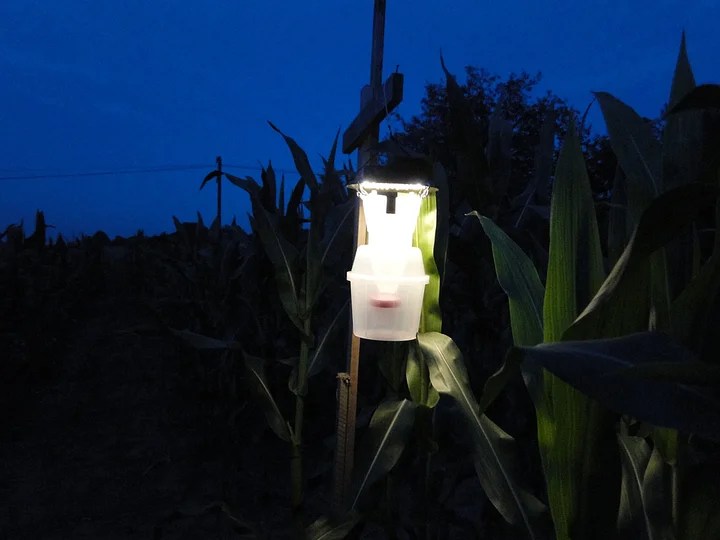
3. Other methods include using sprays like neem oil, diluted sour buttermilk or lassi.
To maintain the balance between friendly and destructive pests in a natural manner, the farmer has also set up bird perches in the field.
“Also, there are bugs that feed on pests. One such bug is the ladybug that feeds on crop-destroying pests and insects and can eat up to 60-70 of them in a day. So they should not be harmed,” says Singh.
Maintaining soil health is another crucial aspect of organic farming. To ensure this, Singh has adopted the following methods:
1. Jeevamrut
An excellent source of natural carbon, nitrogen, phosphorus, potassium and other micronutrients for the soil, jeevamrut increases the microbial count and friendly bacteria in the soil and improves its pH levels. It is suitable for all crops and also improves aeration through increased earthworm activity by bringing minerals from the depths of the land to the surface.
Finally, when compared to other forms of manure, it can be prepared quickly, within five days.
How to prepare jeevamrut?
Fill a barrel with 200 litres of water and add 10 kg desi cow dung (gobar), 10 litres of cow urine, 1 kg of jaggery, 1 kg of gram flour (besan) and 500g of soil.
Keep the barrel in the shade and stir the mixture anti-clockwise twice a day for a minimum of 10 minutes with a wooden log. Once ready in five days, it can be applied to the soil. A 200-litre solution of jeevamrut will suffice for a one-acre plot and improve the yield.
2. Gobar ke paathi (Dung cakes)
This refers to the use of six-month-old dried cow dung cakes. Apart from being used as fuel for chulhas in the household, these dry cow dung cakes can be useful in reviving your soil.
“We take these six-month-old dry cow dung cakes and dip them in a tub of water. Leave it there for four days. The resulting solution can be sprayed across the field as a rich source of micronutrients.”
3. Green manuring
It refers to the practice of growing, mulching by ploughing and mixing of green crops with soil. This improves the physical structure and soil fertility. Green manure crops usually belong to the legume family and are nitrogen-fixing in nature.
He also uses farm-made vermicompost and vermiwash to improve soil health.
Earnings vs the satisfaction of being a farmer
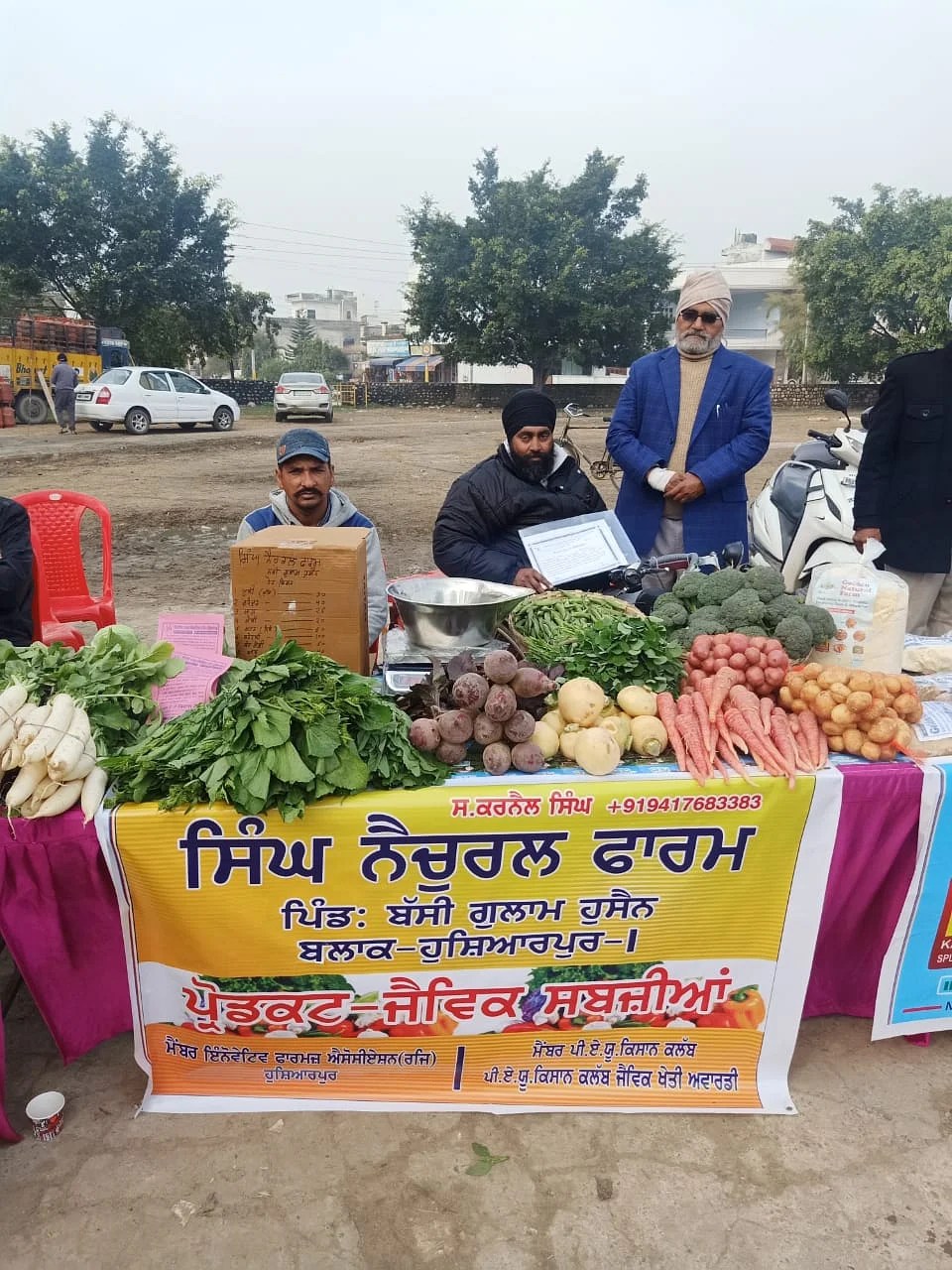
All things said, while organic farming reduces input costs for farmers drastically, it is incredibly labour-intensive, and the weeding costs can be high.
When asked if he isn’t afraid of suffering losses, the humble farmer says, “Organic produce is gaining popularity, and the demand is slowly but steadily rising. Today, apart from the IFA haat, I also sell my produce every Sunday at the certified organic farmers’ market in Hoshiarpur, which was set up with the district administration’s efforts, especially the vision of our current District Collector, Isha Kalia.”
Does his produce get a reasonable market rate?
Smiling, he says:
“I sell my veggies at the same market price as regular vegetables. Many people think that it is a loss-making decision. But I want my customers to come from all walks of life. If a person in a high-end luxury car can buy it, I want a person who rides a bicycle to be able to afford it too. So whether I earn profits or not, doesn’t matter. Logon ke ghar amrit jaana chahiye, zeher nahi (People should consume healthy food, not poison). I am content with the income that I am earning. My kids are studying. The household is running and there’s food on the table. What more does a farmer want?”
Singh’s farm is an open space of learning for farmers, educationists and experts today. Apart from taking these visitors across the farm, he also counsels many farmers from different states over the phone.
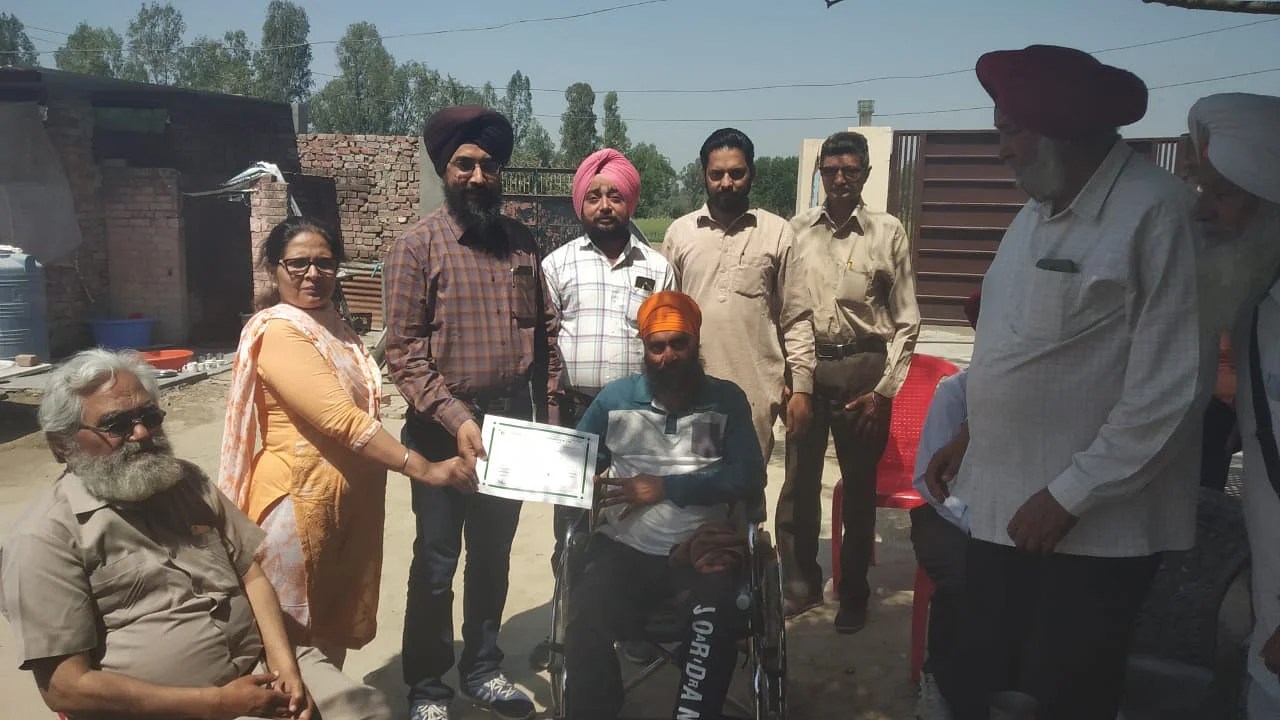
“I don’t want to keep any secrets. I want people to turn to organic farming. I want to use newer techniques too. This summer, I will expand the varieties of seasonal veggies I grow to 50 and sell all of my produce at the farmers’ market.”
The inspiring farmer ends with a few messages for other farmers and people with disabilities.
“I request my farmer brothers and sisters to choose the organic way of life over death. Yes, the path to organic farming is difficult, and you may suffer losses when you begin. But the satisfaction and joy of people consuming poison-free produce are unmatched. Stop buying chemically-grown foods from the market. Start with half an acre, even if it is for your own family. And then expand.”
“To those who have any form of a disability please understand—Tan se handicap ho toh kya? Mann se na ho (Your body may be disabled, but your mind isn’t). Don’t consider yourself inferior to anyone. So whatever it is that makes you happy and gives new purpose to your life, don’t give it up!”
If this story inspired you, get in touch with Karnail Singh on +919417683383
Also Read: Deep in Chambal Lies Rajasthan’s 1st Smart Village. Here is its Incredible Story
